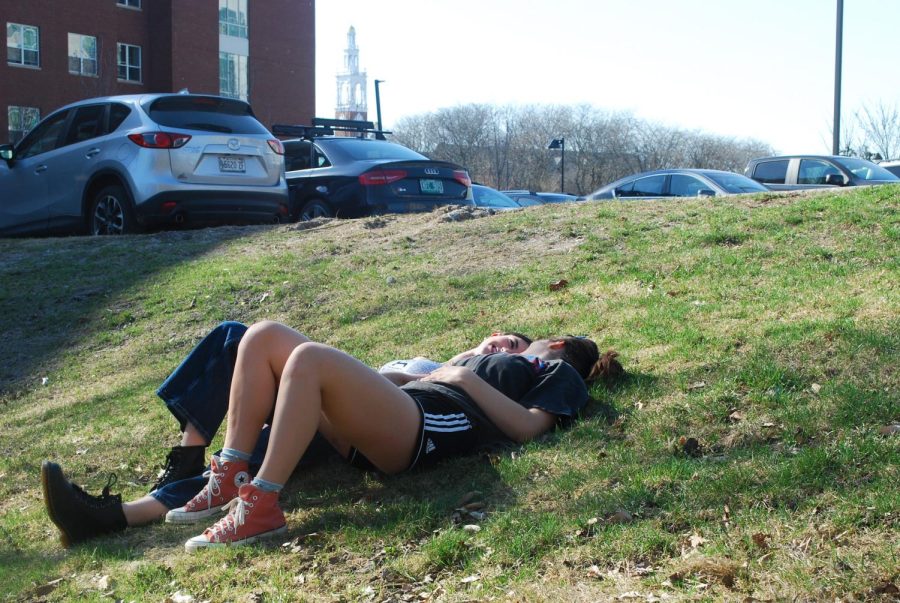Being gross in Grossman and handsy in Howe: The rise of PDA on campus
Photo Illustration: A couple laying on campus grass. Some students are distressed with public displays of affection on campus.
April 23, 2023
There is a serious issue that has been distressing certain members of UVM’s student body for some time now, and some students feel it has gotten especially out of hand in recent months—public displays of affection.
The Cambridge Dictionary says PDA includes actions such as kissing or loving touches given in public. Both a hot-and-heavy makeout session in front of the Grossman School of Business fall under this definition.
On a college campus, the line between private and public spaces becomes fuzzy. Many students live only a few minutes from where they go to class or eat, and it can be difficult to tell what constitutes appropriate behavior.
Different locations on campus have varying degrees of etiquette concerning PDA. Given the unique communal nature of a college campus—with private, public and academic spaces blurring—it can be difficult to know when public displays of affection are appropriate.
When talking with students about PDA, it becomes clear that many have strong opinions about when and where public displays of affection are appropriate.
Sophomore Sophie Borah said she noticed a rise in PDA as of recently.
“It’s extremely graphic and overall makes me feel very uncomfortable,” Borah said. “I didn’t think it was as large of an issue last year, but now I feel like I can’t go a day without seeing it.”
While some find PDA upsetting, others are indifferent on the matter. Sophomore Emily Schlisman enjoys it, she said.
“It reminds me there is love out there, but I also really like the drama,” Schlisman said.
When asked about where and when they considered PDA appropriate, many students agreed there are few instances where they found it to be so.
“It’s everywhere,” sophomore Emily Mistretta said. “Just keep it in your room. I don’t want to see it. Classrooms should just be an obvious one, I don’t know why anyone ever thought that that was appropriate.”
Some students find PDA in certain areas on campus to be extra taboo.
“I think anywhere on the Central campus or anywhere public should be off-limits,” Borah said.
PDA of varying levels happens in many places on campus, including classes, the library, the Davis Center, dining halls, the gym and in the hallways of their dorm buildings.
However, it is the PDA in academic settings that seems to be the most upsetting to students.
“Oh, yes, the library is one of the main perpetrators,” Mistretta said. “I don’t understand why people go to the library to hang out and cuddle.”
PDA specifically in the classroom can be particularly uncomfortable for some students.
“That’s all I can focus on,” Mistretta said. “If there’s someone canoodling in the corner, I’m not going to be able to listen to what the professor has to say because I’m uncomfortable.”
Since there is no way to regulate when and where PDA occurs, the responsibility falls on individuals to be aware of their surroundings and considerate of their community.
For Mistretta, there is a good rule of thumb for couples in public.
“I’d like to just assume that you all are friends, I don’t want to know that you’re a couple,” she said. “I want to have to wonder about your relationship status.”







